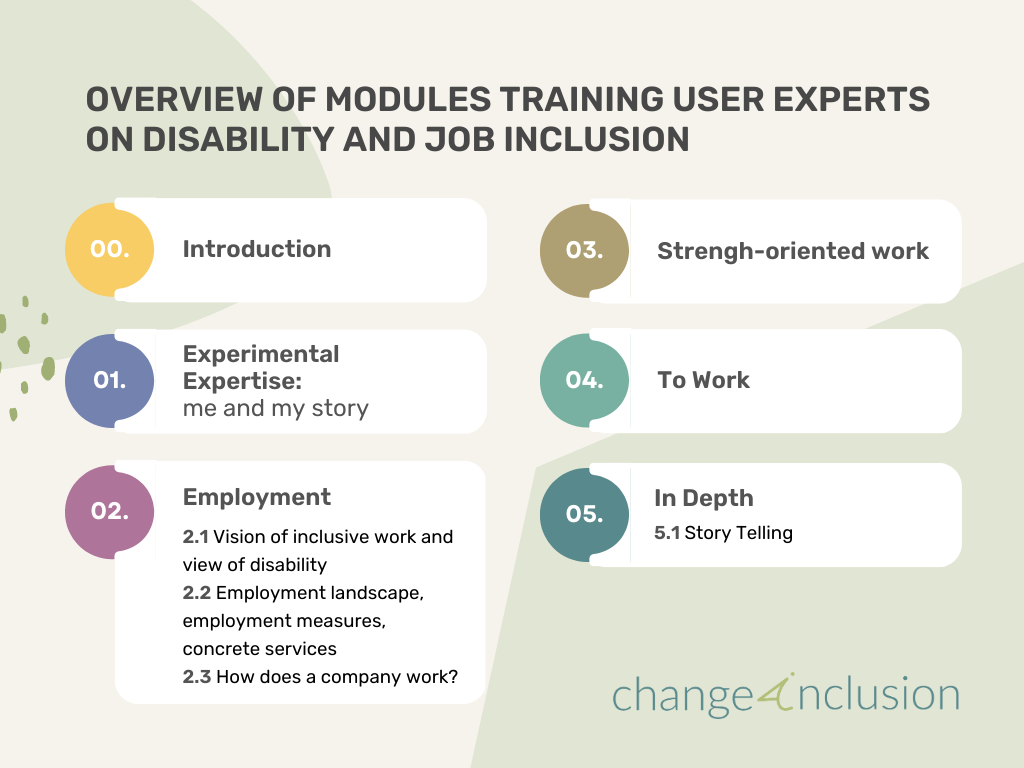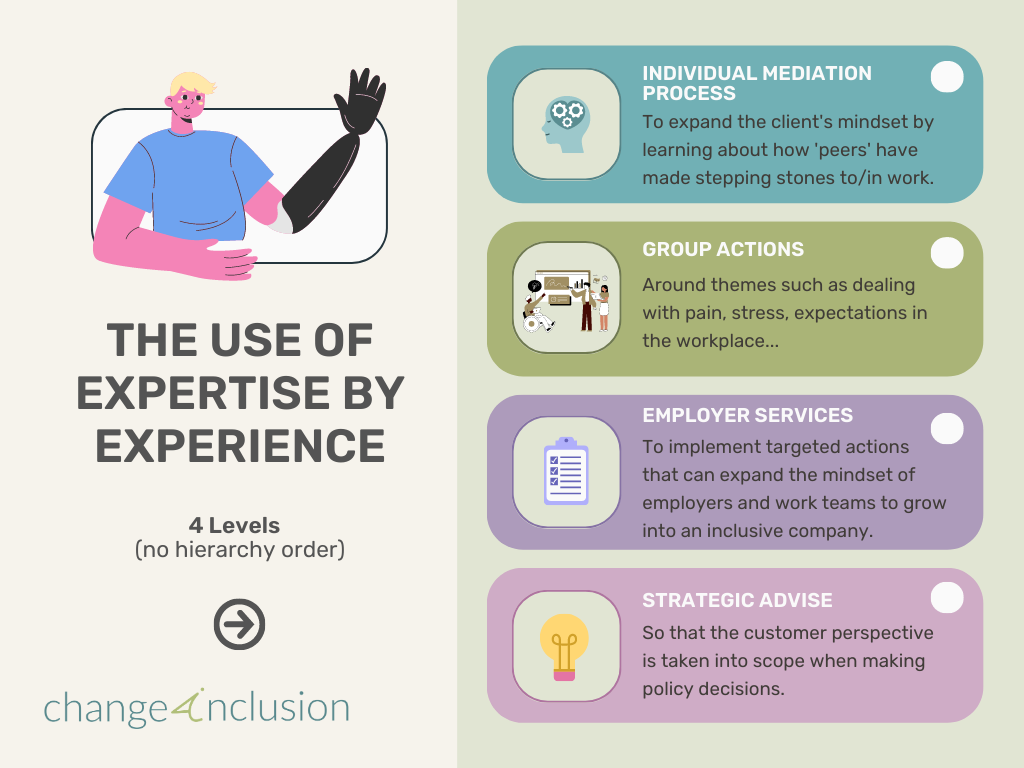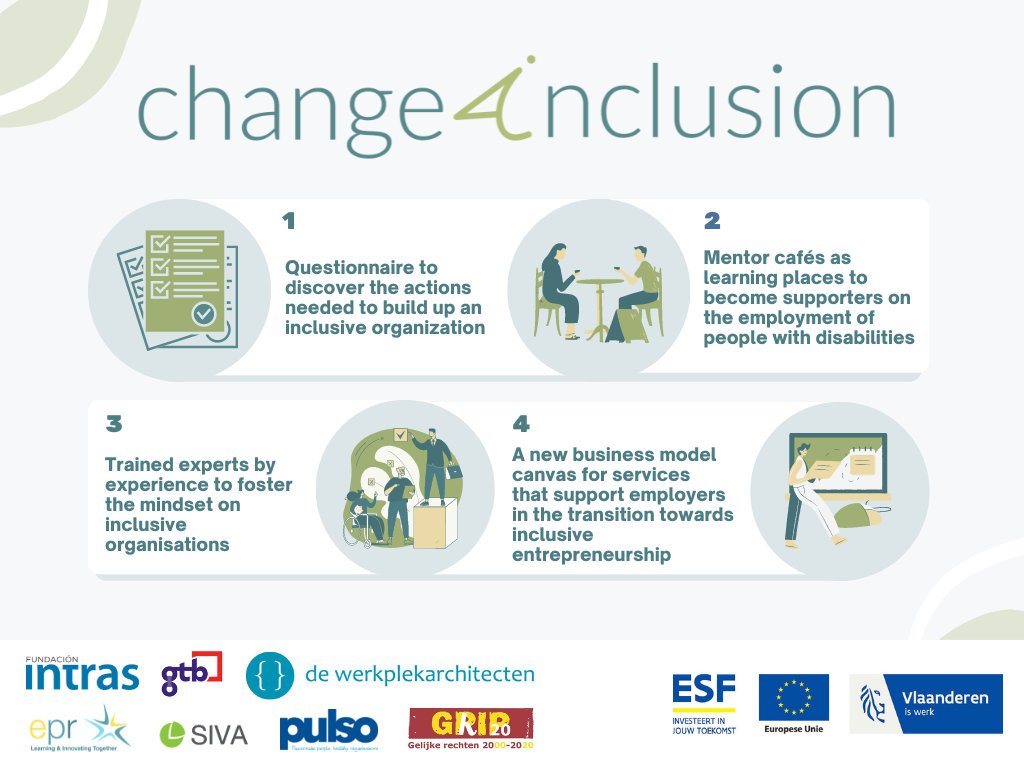EPR Change4Inclusion Project Dissemination Webinar
EPR on 22 February 2023 organised a webinar for EPR members and other interested stakeholders to present – based on 6 inputs – the tools developed and to discuss the main learnings. The master slide is available on the Change4Inclusion project webpage. The event with a total of 22 participants (of which 13 participants from 6 EPR members from 5 countries and 9 external participants) also attracted the DG EMPL Policy Officer coordinating the Disability Employment Package and the Secretary of the PES Network (European Network of Public Employment Services).
In a first session, Mathias Maucher, EPR, presented an overview of the project. Patrick Ruppol, GTB, and Kimberley Desie, Pulso Europe, introduced the C4I Interview Guidelines and Interview Manual, dealing with conceptual questions, how the Talentoscoop tool was used and further developed, which experiences the Flemish project partners had when testing the tools and what is still planned as improvements. Mathias Maucher, EPR, on behalf of Katrina Sevruka, SIVA, brought in the Latvian perspective and summarised the experiences SIVA had when using the pilot version of the interview guidelines and manual with employers in Latvia.
This first block was followed by a joint contribution of Piet Lareu, werkplekarchitekten/Sterpunt Inclusief Ondernemen, who focused on the idea behind and the concept of “MentorCafé” and the need to also train the mentors , and by Patrick Ruppol, GTB, who elaborated on the design of the training of peer mentors and how to best use persons with disabilities in their role as experts by experience, also speaking about the first experiences obtained from a collaboration with organisations representing persons with disabilities. Pablo Sanchez brought in the Spanish perspective by elaborating on experiences with the involvement of peer mentors and their training for them to be involved in activities of INTRAS in the context of the Peer2Peer Project focusing on the recovery of people with mental disabilities through peer support training and employment.
In the third block, Patrick Ruppol explained how GTB developed the business case for the range of initiatives to move towards inclusive enterprises or organisations and presented the policy recommendations elaborated by the Flemish project partners.
During the Q&A session, Mathias asked the participants to share their learnings from the C4I Project and if the tools developed could be adapted to their own national context and/or their own organisation. The main items raised were
- the design of the single point of contact (SPOC) for employers interested in employing PwD, in adapting their recruitment processes (and the coordination of services GTB can offer in partnership with other organisations);
- the funding models in place in Flanders for the services using the Talentoscoop model and for which services employers have to pay (after the first contact which is free for them);
- the use of peer-to-peer models for persons with intellectual and learning differences, but also with mental health conditions and how to integrate tools of co-production, empowerment and direct participation into regular services and policies which are also sufficiently financed and get public funding for a longer period; and
- the Disability Employment Package as part of the European Disability Strategy 2021-2030 and guidance by the European Commission (including on the promotion of hiring perspectives through affirmative action (which covers Talentoscoop, not C4I, as a good practice example).
The evaluation of the webinar was very positive, obtaining an average score of 4.5 out of 5 for the knowledge and experiences gained and the expectations to the event fulfilled. 3 out of 4 respondents said they could well use the information gained and the tools elaborated. The interaction was rated 4.75 out of 5 and the workshop moderation and facilitation 5 out of 5.
Change4Inclusion Project: Summary Information
Change4Inclusion (C4I) is a ESF+ project led by GTB (running from July 2021 to February 2023) in partnership with EPR (Belgium), SIVA (Latvia), Fundación INTRAS (Spain) and three partners from Flanders (werkplekarchitekten/Sterpunt Inclusief Ondernemen, Pulso Europe and GRIP). The project aims to support employers to work towards inclusive workplaces and to make a shift of mindset towards a learning and inclusive organisation culture.
C4I builds on an earlier project involving EPR and run by GTB, Talentoscoop (cf. the project page in Dutch), which developed a service model in which every social NGO has a single point of contact to connect organisational questions with recruitment of new staff, retention of already employed staff, workplace learning and job creation.
Whereas Talentoscoop dealt more with questions of professional inclusion and human resource management, the focus of the Change4Inclusion Project is more on how (top-)management can realise an inclusive organisation, based on own values and the own service mission and on how the organisation culture can be changed in a sustainable manner towards one promoting the inclusion of workers with a disability or health problem.
In 2022, the two transnational project partner meetings were held in Jūrmala, Latvia, on 29 and 30 March, hosted by SIVA, and in Valladolid, Spain, on 13 and 14 September, hosted by INTRAS. They served as key moments to present, discuss and provide feedback on the six main deliverables of the project.
The Flemish project partners, building on feedback from the international partners Fundación INTRAS (Spain), SIVA (Latvia) and EPR (Belgium) and on the testing of an interview guideline and manual, have elaborated new and adapted a number of existing tools. Their use will also help to anchor inclusive job design (including by means of job crafting and job carving) in a sustainable way in an enterprise or an organisation.
These deliverables and tools consist of 6 main project deliverables.
- Deliverable 1: Instrument to measure inclusive enterprises/organisations and inclusion at the workplace: Talentoscope/C4I Interview Questionnaire & Interview Manual
- Deliverable 2: Manual/Guidance for Coaches for Mentors (in Mentorcafés)
- Deliverable 3: Training Modules for experiential experts in the fields of disability and labour market inclusion
- Deliverable 4: Policy advice on the use of expertise by experience/experiential experts in labour market inclusion and vocational rehabilitation services.
- Deliverable 5: Business Case Model/Canvas
- Deliverable 6: Policy Recommendations
Below we show infographics for the deliverables 1, 2 and 4.
Guidelines for interviews with employers and an interview manual”
The “MentorCafé” concept and the training of mentors

Guidance for the involvement of peer mentors/experiential experts and their training






 This website received support from the EPR framework partnership agreement with the European Commission, DG Employment, Social Affairs and Inclusion for 2018-2022 from the EU Programme for Employment and Social Innovation (EaSI). For further information please consult:
This website received support from the EPR framework partnership agreement with the European Commission, DG Employment, Social Affairs and Inclusion for 2018-2022 from the EU Programme for Employment and Social Innovation (EaSI). For further information please consult: